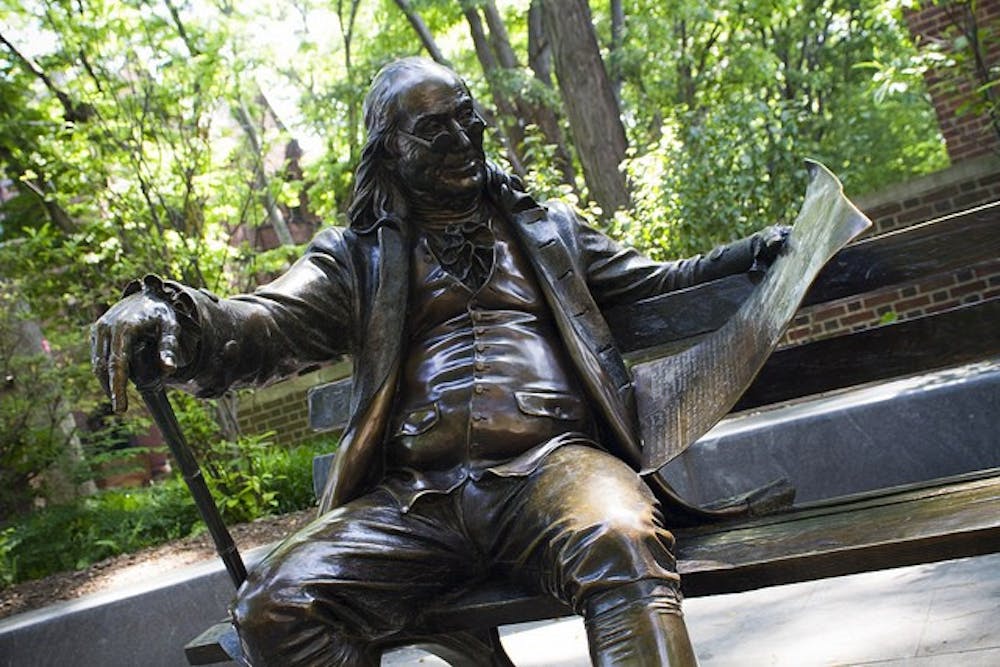
These were the opening lines of my "Why Penn" essay:
“What draws me to the University of Pennsylvania is actually a simple question — who doesn’t love Benjamin Franklin? He was an eloquent, sophisticated diplomat, a founding father, a mad scientist, and the list goes on.”
While these lines are cringey to read a year later, they represent what Ben Franklin meant to me then. Growing up, I knew him as the scientist who invented the lightning rod. Later I knew him as the figure on the one-hundred-dollar bill when I started school in the United States in seventh grade. Then, in U.S. History last year, he stood out as an important figure who helped draft the Declaration of Independence and the Treaty of Paris. He was also a successful business owner, perhaps a physical embodiment of the American “self-made man,” who rose up from a modest background to become a wealthy businessman through his printing enterprise. When I was applying to Penn — an institution founded by him and established upon his ideals — I imagined myself to be immersed in many different disciplines, in a school that turned its students into people like Franklin himself.
However, after I started Penn, I realized the problematic aspects of Ben Franklin’s ideals. For instance, in his list of thirteen virtues, including, temperance, order, and resolution, we can see his attempt to achieve an image of perfection. Similarly, we as Penn students have also been trying to uphold the flawlessness of what we imagine a flawless Ivy League student to be.
While the pursuit of such ideals is never bluntly proclaimed, we, as Penn students, are all striving to become like Franklin, whether in our socioeconomic pursuits or in our ambitions to make our own impacts in the world. There is the pressure to do well in everything and to be as perfect and well-rounded as our founder was — that is, to be able to maintain a good GPA, to party, to run a flawless social media account, and to secure a future career.
In professor Jed Esty’s ENGL 109 course Literature and Business this semester, we read D.H. Lawrence’s criticism on Ben Franklin. The article influenced my thoughts on this sense of perfection that Franklin and many of us have been trying to achieve.
“Why then did Benjamin set up this dummy of a perfect citizen as a pattern to America? Of course, he did it in perfect good faith, as far as he knew. He thought it simply was the true ideal. But what we think we do is not very important. We never really know what we are doing.”
While this article is perhaps a little sacrilegious to read, especially at a school upholding the values that Ben Franklin presented, there is reason in Lawrence’s argument. In Franklin’s and our own pursuits of perfection, we often put on our “Penn faces” and box ourselves into definitions, telling ourselves that we must get a certain grade, be in a certain sorority, or earn a certain internship. But do we really want those things, or are they attempts to prove our worth? At the same time, we ignore the stress that comes along with such daily pursuits of perfectionism.
There is certainly merit in our pursuit of a higher education and a better life — both spiritually and financially. But there are also costs to consider: By striving to become the perfect Penn student, we have limited ourselves, and we thus fail to make room for spontaneous adventures and explorations in our majors, career paths, and our own identities. While Ben Franklin has founded the University, he may not be the perfect role model to follow.

CATHERINE QIAO is a Engineering and Wharton freshman from Shanghai. Her email address is jqiao22@wharton.upenn.edu.
The Daily Pennsylvanian is an independent, student-run newspaper. Please consider making a donation to support the coverage that shapes the University. Your generosity ensures a future of strong journalism at Penn.
Donate







